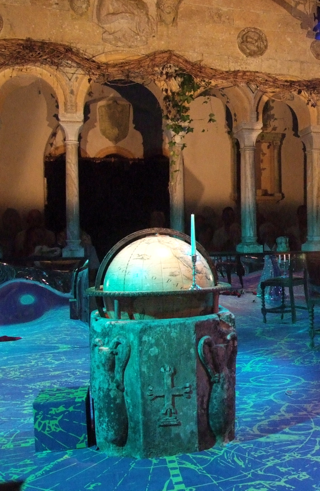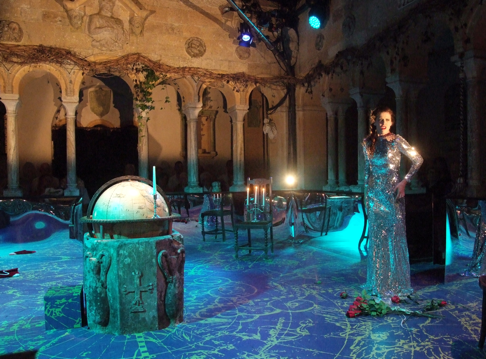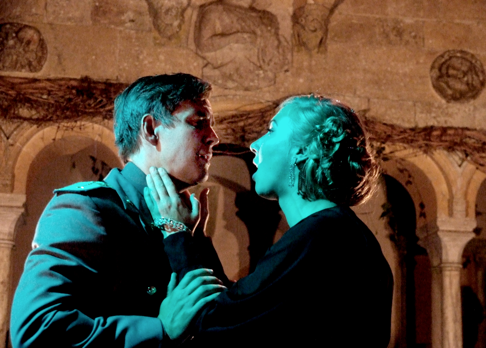Recently in Performances
English Touring Opera are delighted to announce a season of lyric monodramas to tour nationally from October to December. The season features music for solo singer and piano by Argento, Britten, Tippett and Shostakovich with a bold and inventive approach to making opera during social distancing.
This tenth of ten Live from London concerts was in fact a recorded live performance from California. It was no less enjoyable for that, and it was also uplifting to learn that this wasn’t in fact the ‘last’ LfL event that we will be able to enjoy, courtesy of VOCES8 and their fellow vocal ensembles (more below …).
Ever since Wigmore Hall announced their superb series of autumn concerts, all streamed live and available free of charge, I’d been looking forward to this song recital by Ian Bostridge and Imogen Cooper.
Although Stile Antico’s programme article for their Live from London recital introduced their selection from the many treasures of the English Renaissance in the context of the theological debates and upheavals of the Tudor and Elizabethan years, their performance was more evocative of private chamber music than of public liturgy.
Evidently, face masks don’t stifle appreciative “Bravo!”s. And, reducing audience numbers doesn’t lower the volume of such acclamations. For, the audience at Wigmore Hall gave soprano Elizabeth Llewellyn and pianist Simon Lepper a greatly deserved warm reception and hearty response following this lunchtime recital of late-Romantic song.
For this week’s Live from London vocal recital we moved from the home of VOCES8, St Anne and St Agnes in the City of London, to Kings Place, where The Sixteen - who have been associate artists at the venue for some time - presented a programme of music and words bound together by the theme of ‘reflection’.
'Such is your divine Disposation that both you excellently understand, and royally entertaine the Exercise of Musicke.’
‘And there was war in heaven: Michael and his angels fought against the dragon; and the dragon fought and his angels, And prevailed not; neither was their place found any more in heaven … that old serpent … Satan, which deceiveth the whole world: he was cast out into the earth, and his angels were cast out with him.’
There was never any doubt that the fifth of the twelve Met Stars Live in Concert broadcasts was going to be a palpably intense and vivid event, as well as a musically stunning and theatrically enervating experience.
‘Love’ was the theme for this Live from London performance by Apollo5. Given the complexity and diversity of that human emotion, and Apollo5’s reputation for versatility and diverse repertoire, ranging from Renaissance choral music to jazz, from contemporary classical works to popular song, it was no surprise that their programme spanned 500 years and several musical styles.
The Academy of St Martin in the Fields have titled their autumn series of eight concerts - which are taking place at 5pm and 7.30pm on two Saturdays each month at their home venue in Trafalgar Square, and being filmed for streaming the following Thursday - ‘re:connect’.
The London Symphony Orchestra opened their Autumn 2020 season with a homage to Oliver Knussen, who died at the age of 66 in July 2018. The programme traced a national musical lineage through the twentieth century, from Britten to Knussen, on to Mark-Anthony Turnage, and entwining the LSO and Rattle too.
With the Live from London digital vocal festival entering the second half of the series, the festival’s host, VOCES8, returned to their home at St Annes and St Agnes in the City of London to present a sequence of ‘Choral Dances’ - vocal music inspired by dance, embracing diverse genres from the Renaissance madrigal to swing jazz.
Just a few unison string wriggles from the opening of Mozart’s overture to Le nozze di Figaro are enough to make any opera-lover perch on the edge of their seat, in excited anticipation of the drama in music to come, so there could be no other curtain-raiser for this Gala Concert at the Royal Opera House, the latest instalment from ‘their House’ to ‘our houses’.
"Before the ending of the day, creator of all things, we pray that, with your accustomed mercy, you may watch over us."
The doors at The Metropolitan Opera will not open to live audiences until 2021 at the earliest, and the likelihood of normal operatic life resuming in cities around the world looks but a distant dream at present. But, while we may not be invited from our homes into the opera house for some time yet, with its free daily screenings of past productions and its pay-per-view Met Stars Live in Concert series, the Met continues to bring opera into our homes.
Music-making at this year’s Grange Festival Opera may have fallen silent in June and July, but the country house and extensive grounds of The Grange provided an ideal setting for a weekend of twelve specially conceived ‘promenade’ performances encompassing music and dance.
There’s a “slide of harmony” and “all the bones leave your body at that moment and you collapse to the floor, it’s so extraordinary.”
“Music for a while, shall all your cares beguile.”
The hum of bees rising from myriad scented blooms; gentle strains of birdsong; the cheerful chatter of picnickers beside a still lake; decorous thwacks of leather on willow; song and music floating through the warm evening air.
Performances

27 Jul 2014
Back to the Beginnings: Monteverdi’s Il ritorno d’Ulisse in patria at Iford Opera.
The Italianate cloister setting at Iford chimes neatly with Monteverdi’s penultimate opera The Return of Ulysses, as the setting cannot but bring to mind those early days of the musical genre.
The world of commercial public opera had only just dawned with the opening of the Teatro San Cassiano in Venice in 1637 and for the first time opera became open to all who could afford a ticket, rather than beholden to the patronage of generous princes. Monteverdi took full advantage of the new stage and at the age of 73 brought all his experience of more than 30 years of opera-writing since his ground-breaking L’Orfeo (what a pity we have lost all those works) to the creation of two of his greatest pieces, Ulysses and then his final masterpiece, Poppea.
As was the fashion, the “new” opera of the 1640s celebrated the precedence of the text over the music. It was said that music served to illustrate and therefore followed the text of the drama in every way, allowing the musicians to fill in the chords between the vocal and bass lines as they wished. More complete orchestration, it was thought, should be confined to musical interludes and aria-type passages. This theory has, it must be admitted, caused many of today’s early musicians many headaches!
At Iford, director Justin Way and conductor Christian Curnyn have sensibly foregone the usual “Prologue” as the original libretto by Badoaro established the fact that humans are just playthings at the mercy of the gods - Time, Fortune and Love .However, after this he also leaps into the story of our hero near the end of his trials and travels, and so we join the story as Penelope weeps and waits for her husband to return, pestered by ambitious suitors, whilst Ulysses is washed up on the shores of Ithaca unaware that the goddess Minerva has an idea......
 Elisabeth Cragg as Minerva
Elisabeth Cragg as Minerva
This Iford Opera production, sung in English, made the most of the tiny space with a vaguely “ancient/mythological” blue flooring design and subdued (and occasionally wayward) lighting. Costumes were also vaguely modern with more than a touch of the dressing-up box, but did little to disturb the intense drama of the piece. A production which served rather than inspired.
However, it was, rightly, the music and the drama which stayed with the audience as we departed into a ridiculously warm and starlit night in the depths of the Wiltshire countryside. Curnyn’s group of eight superb early instrument specialists - with himself at the harpsichord almost part of the drama from time to time - drew us into this time-warp of sound with grace, style and (even more difficult on a sultry evening) amazingly good tuning.
 Jonathan McGovern as Ulysses and Rowan Hellier as Penelope
Jonathan McGovern as Ulysses and Rowan Hellier as Penelope
Of the 12 young singers there can only be praise, and they kept up Iford’s reputation for high quality vocalism. The restricted acting space requires complete immersion in the role as there is literally nowhere to hide when so close to the audience and as actors some were better than others. Here experience tended to tell: standouts had to be Rowan Hellier as a noble, plangent Penelope with rich mezzo tones throughout; Jonathan McGovern as the wandering hero Ulysses who brought a powerful tenor which also could spin a line with ease, and Daniel Auchincloss as the faithful servant/shepherd Eumaeus, who’s early music experience, high tenor and appealing stage presence made themselves felt. Among the more minor roles, the resonant snarling bass of Callum Thorpe as one of the nicely-delineated three suitors was memorable.
Monteverdi is not an “easy” option for any summer festival opera series and Iford Opera is to be congratulated for finding exactly the right mix of musicians and singers to convince and perhaps convert those for whom this was a first experience of how it all started so very long ago.
Sue Loder
Click here for cast and production information.


